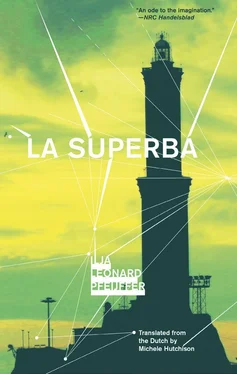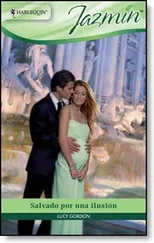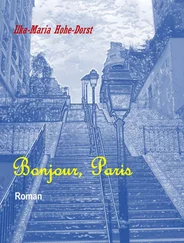But that’s what all of life is like in Italy, from the cradle to the grave. You’re born, grow up, get married and leave home, have children who leave home when they get married, and you die. You celebrate Christmas at Christmastime and eat roast lamb at Easter. You go to the seaside in August. All the shops will be closed. In Genoa, it’s an entire month of scarcely being able to buy the bare necessities. There are only two tobacconists open in the whole city center, one newspaper kiosk, and one liquor store. If you’re lucky. And just try to find them. Bewildered tourists wander around among the closed shutters. The mayor calls for legislative measures, and rightly so, but just try to do anything about it, because everyone goes to the seaside in August and not in June or July, which would be much more sensible since at least there’d be a place on the beach and everything would cost half what it costs in August. But that’s not come si deve .
It is life according to a liturgical calendar of recurrent, annual family parties, family outings, birthdays, name days, home and away matches, qualifying rounds and finals. It’s a spiral that ends after seventy or eighty rotations with a memorial plaque on the gray walls of a church, formulated and designed like all the other memorial plaques. We look back with pride and gratefulness at a rich and full life that progressed just like other lives, in the same streets, on the same squares, in the same houses, and on the same beaches, with breakfast at half past seven, pranzo at half past twelve, cena at nine o’clock, blessed with children and grandchildren who will do everything exactly the same. Stanno tutti bene. Tutto a posto. Come si deve.
I’ve seen a woman who was exactly like that. I see her all over the place because she’s always at the right place at the right time. She has breakfast at Caffè del Duomo on San Lorenzo. She lunches at Capitan Baliano on Matteotti. At six on the dot she comes into the Bar of Mirrors for an aperitif. She has a glass of Prosecco and then, why not, another glass of Prosecco. She always says that as she orders it: “Oh, why not, another glass of Prosecco.” As though it were an exception. And she’ll never order a third glass of Prosecco. She always says that, too: “I never have three glasses of Prosecco as an aperitif. Two is enough for me.” She’s an exemplary Italian in every way. I couldn’t imagine her in any country but Italy. She’s so come si deve that outside of Italy she’d wither and die like a tree that had been transplanted out of the specific, precious microclimate of its natural habitat. On Saturdays she meets her friend on the square at exactly the right time on exactly the right day at exactly the right place to eat pizza. She is exactly fifteen minutes late for the meeting and her friend is exactly fifteen minutes later than she. They then have a fixed ritual of apologies from the lady who’s too late, resolutely waved off by the lady who was less late. It’s a stainless steel routine that’s repeated to the second, time after time, week after week, year in year out, generation after generation.
Two days a week, she has her granddaughter, a notorious redheaded diva of about three years old. She’s called Viola. I know this because that’s what everyone keeps calling her. Her, too. Each time the little girl does something, it doesn’t matter what — climb up onto her lap, climb down off her lap, walk in circles around the parasol stand, stir the Prosecco with her finger — she says, “Viola, don’t do that!” As an aperitif she gets an acqua frizzante with a straw and a bowl of patattine —what do you call those again? Fries? Then she says, “Look, Viola! Here’s Viola’s aperitif!”
The most beautiful girl in Genoa, who works at the Bar of Mirrors, is besotted by Viola. She kisses her, strokes her red curls, cuddles her, and babbles away endlessly to her about the fries, about her new shoes, about the color of the straw, pigeons, parasols, freckles, dancing, and the bandages on her cuts and scrapes that haven’t healed yet. It’s astonishing. It’s a holy miracle to witness. The magic of the fairy-tale harmony between a little tyke and a good fairy. The most beautiful girl in Genoa should be as unapproachable as a glimpse of an image you catch in a mirror, but before my very eyes she turns into the most endearing essence of approachability. The old lady watched with the smile of an Italian grandmother who found it only natural that her granddaughter should be adored by waitresses. I decided to speak to her.
I loved speaking Italian. I wasn’t very good at it, but I liked to, which seems to me to perfectly fit the definition of an amateur. Whenever I was on a roll, or at least thought I was, it felt like swimming in the waves of a warm sea. I could bob on the rhythm of the long and short syllables. I would stretch myself out on long, clear vowels and then make a playful, thrashing sprint across the staccato of consonants. I’d dive down into a daring construction, knowing I’d need a subjunctive sooner or later, but would come up spluttering. It didn’t matter what it was about or whether it was about anything. It was a game. I didn’t need to swim anywhere; it was enjoyable enough just to be in the water.
Although I loved Italian and tried my best to learn it, I didn’t really take it seriously as a language. It’s a language for children, a language that tastes of rice with butter and sugar. The language is perfectly suited to a month at the seaside in August with the whole family, when the world can be easily organized and divided into clear categories like bello and brutto, buono and schifoso, libero and occupato, pranzo and cena . The language is also exceptionally suited to shouting at children the whole damn day that they shouldn’t do that, whatever it is they’re doing, and to say that’s enough. You can also say goodbye to each other the whole day in it. It’s a language that makes a racket and that’s the only thing that counts, like when children are happy, weeks-on-end happy, drive-you-crazy happy with a rattle.
But I was, too. I was happy. I wanted to make a racket. And the fact, the more than obvious fact, that I had to practice and improve my Italian gave me a wonderful excuse to address complete strangers on any random subject. I would never do that in my own language because those people don’t interest me, let alone what they have to say, and because my own language isn’t a toy. And if I accidentally say something insulting in Italian, I can always add a few grammatical blunders and then sit there smiling naively like a screwball foreigner. I could get away with anything — that was what was so fun about it.
So that was how I spoke to Viola’s grandmother. She was so Italian and so come si deve I thought she’d prove entertaining training material.
9.
“My name is Franca. But it’s better that you call me Signora Mancinelli and use the formal mode of address because you have to practice your Italian and the formal modes are more difficult. And you? What? Giulia? Giulian? Gigia? Leonardo. That is a bit easier, indeed. Like Leonardo da Vinci. I can remember that. Or, if you asked today’s youth, Leonardo DiCaprio. I’m an elderly lady of the upper class. They still had education in my days. I know who Leonardo da Vinci was. See that man over there? Look hard.”
He sits on the terrace at the Bar of Mirrors almost every day, a bon vivant, suffering from some subsidence, who acts too young for his age. He has white hair and wears brightly colored Hawaiian shirts from the plastic boxes of remainders at the market. When he comes shuffling along with his plastic bags from the Di per Di, he looks like a tramp. But once he’s sitting down he orders a mojito. Tramps don’t drink cocktails. And he has plenty of chitchat. Everyone who says hello to him is treated to an undoubtedly priceless anecdote, freshly plucked from the riches of his daily life. He bares his teeth as he smiles and draws passersby and waitresses into his monologue. He wears glasses on his forehead, which are supposed to give him the air of an elderly intellectual. But I don’t fall for that. He has holes in his shoes. His eyes are deep-set, his cheeks have caved in, and his stubble sticks to his chin like the frayed edges of an unwashed bathmat. He nods briefly at fellow tramps passing by over the gray paving stones.
Читать дальше












